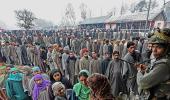'The bureaucrats and police officers who organised the unprecedented arrangements to ensure that there were no protests after the constitutional changes clearly had no idea of the importance in Kashmiri culture of keeping in touch, and of expressing oneself,' says David Devadas.

The communications blockade in Kashmir has now been in place for almost a month.
Public anger on the ground has been felt at several levels. Some focus on the constitutional changes, and responses to that vary in intensity.
On the other hand, there is widespread anger over the lockdown, especially the communications blockade.
Missing out on one’s mother's voice waking one up on Eid… for many Kashmiri students and others staying outside Kashmir, that will be remembered as the most traumatic bit of the multi-faceted setbacks of the past month.
If they were home, they would have preened as their mother served salt tea and `bakery’ delicacies from the local tandoor-baker, the kandru. From afar, just her voice over the telephone would have been a large part of what made Eid the festival it is.
Whoever designed the elaborate restrictions and arrangements to roll out constitutional changes regarding Jammu and Kashmir evidently had little idea of the inner crevices of sentiment in Kashmir. The umbilical cord lasts forever.
That the love of the mother reigns supreme in the innermost corners of the heart has been obvious in the social media comments of a host of Kashmiris, from student-leader-turned-political-activist Shehla Rashid to strapping, hirsute, baritones with choking voices.
Those who kept Kashmiri militants in lock-up during the 1990s affirm that no detainee ever asked to meet his father. Each wanted to meet his mother, and then his brother. It’s true.
Connectivity
In that light, it is unfortunate that so many Kashmiris could not be in touch with their mothers (or conversely, sons or daughters) on Eid. The anguish and angst of that morning will never quite heal.
No doubt, a large number of them also missed the voice of a beloved, but the trauma of a missed mother’s voice too was all too real.
So the restoration of telephone connectivity -- albeit partial -- is most welcome. It will make a huge difference to the sentiments of people in Kashmir.
Those who have not lived and imbibed the social and cultural patterns of Kashmir cannot quite fathom the importance of inter-personal communication in Kashmiri society.
The dub, a jutting closed balcony, was a characteristic part of traditional Kashmiri architecture. It allowed for conversations across the road, and with passersby below -- and of course let one observe others as they go by.
Daily doses
From early morning, men gather at the local baker’s shop to get girda bread for breakfast, and exchange news and views. Some gather in knots outside a mosque after prayers for similar exchanges.
Through the day, the kitchen of a traditional Kashmiri household is a micro convention centre. Neighbours and relatives drop in for tea and talk. It’s the stuff of life.
Even while the place was locked down, as it was since August 5, people would visit each other using back lanes -- even more eager for a chat than in 'normal' times.
Out of touch
The bureaucrats and police officers who organised the unprecedented arrangements to ensure that there were no protests after the constitutional changes clearly had no idea of the importance in Kashmiri culture of keeping in touch, and of expressing oneself.
During the 1990s, teenagers and others take to landline telephones for hours -- literally hours, often through much of the night -- although it used to take several minutes to connect a call until the latter part of that awful decade.
When mobile phones came in a little more than a decade ago, the density of SIM cards in some areas, and the numbers of calls too, attested to the Kashmiri deep need to talk, to be heard.
Over the past few years, some particular television talk show anchors have been objects of hate in Kashmir. Yet, as long as those shows were aired there, people watched in droves, for that would be the basis of their discussions the next day.
Loud protests
The deeply-felt need to express oneself, and to be seen and heard, is partly responsible for the obstreperous demonstrations and protests that are so common in Kashmir.
Since time immemorial, the discourse in Kashmir has centred on narratives of victimhood and oppression. It is only in the early years of this century, that a new confidence was evident among sections of young people.
They were prosperous, third generation beneficiaries of the most radical land reforms anywhere in the world. And they were full of aspirations, to make a name in the world.
Over the course of the current decade, narratives have changed, and become darker, more pessimistic.
Stories of not having heard a mother’s voice on Eid might now become a tiny but deeply felt addition to the dark narratives.
David Devadas is the author of The Story of Kashmir and The Generation of Rage.











 © 2025
© 2025